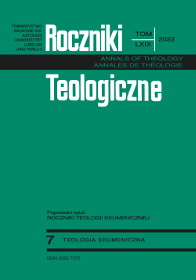Reconciliation by Remembrance and Dialogue: Religious Psychological Remarks
Abstract
The year 2021 was marked, among other things, by the commemoration of the invasion by the Wehrmacht of the Soviet Union in June 1941 and the subsequent war of extermination. This attack was closely linked to the resulting breach of the Moscow Treaties between Germany and Germany and Russia in 1939, which were actually propagated as nonaggression and friendship pacts but the double occupation of Poland by the Wehrmacht and the Red Army as well as the occupation of the occupation of the Baltic states and the opportunity for a German campaign against the West, and culminated in the attack on the Soviet Union. Thus, this date is associated with several traumas in numerous European countries. The following remarks show, from the perspective of the psychology of religion, how these traumas can contribute to stages of reconciliation with oneself, with others, and with life through constructive remembering in dialogue.
References
Antonovsky, Aaron. Health, stress, and coping. San Francisco: Jossey-Bass, 1999.
Argyle, Michael. Psychologie und Religion. Eine Einführung. New York: Routledge, 2000.
Bandura, Albert. Soziale Grundlagen des Denkens und Handelns: Eine sozial-kognitive Theorie. Englewood Cliffs: Prentice Hall, 1986.
Burke, Peter. „History as Social Memory.“ In Peter Burke. Varieties of Cultural History, 43−59. Ithaca, NY: Cornell University Press, 1997.
Dierig, Harald. Der leidvolle Weg zu einem neuen Zuhause. Münster: Aschendorff Verlag, 2013.
Frankl, Viktor E. Der unbewusste Gott: Psychotherapie und Theologie. München: DTV, 1975.
Franzenburg, Geert. „Tradition as a living treasure.“ Münster Trimda-Forum 1(2012).
Franzenburg, Geert. „Distance, remembrance, tolerance.“ PEC 47(2012): 40−49.
Franzenburg, Geert. „Displaced Values. From remembrance to resilience.“ PEC 56(2013): 59−65.
Franzenburg, Geert. „When your son asks you.“ PEC 65(2015): 66−72.
Franzenburg, Geert. „Remembering rituals and rules.“ Münster Trimda-Forum 4(2015).
Franzenburg, Geert. Erinnern verbindet. Norderstedt: BoD, 2016.
Franzenburg, Geert. „Erinnertes äußern.“ Europa−Forum Philosophie 5(2016): 85−100.
Franzenburg, Geert. „How to draw benefit from remembrance.“ Münster Trimda-Forum 5(2016).
Franzenburg, Geert. „Sustainability by education.“ DCSE 7(2016): 100−111.
Franzenburg, Geert. „Trauma as chance and challenge.“ PPC 10(2016): 13−21.
Franzenburg, Geert. Coping by remembering. Norderstedt: BoD, 2018.
Franzenburg, Geert. Stoppt Barbarossa! Norderstedt: BoD, 2020.
Glaser, Barney G. and Strauss, Anselm L. The Discovery of Grounded Theory: Strategies for Qualitative Research. Chicago, Aldine Publishing Company, 1967.
Hutton, Patrick H. „Sigmund Freud und Maurice Halbwachs. Das Problem des Gedächtnisses in der historischen Psychologie.“ The History Teacher 27(1994), 2: 145−158.
Jakobi, Franz-Joseph und Link, Roswitha (Hg.). Geschichte im Gespräch: Kriegsende 1945 und Nachkriegszeit in Münster. Münster: Agenda Verlag, 1997.
Jung, Carl Gustav. Psychologische Typen. Zürich: Rascher & Co. Verlag, 1921.
Khumalo, Itumeleng P. The evaluation of the General Psychological Well-being and the Mental Health Continuum Models in an African context. Potchefstroom: Potchefstroom University Press, 2010.
Kirkpatrick, Lee A. „Bindung und religiöse Repräsentationen und Verhalten.“ W Handbook of Attachment: Theory, research, and clinical applications, 803−822. New York: The Guilford Press, 1999.
Leavy, Patricia. „The Memory-History-Popular Culture Nexus.“ Sociological Research Online 10(2005), 1.
Olick, Jeffrey K. and Robbins, Joyce. „Social Memory Studies. From `Collective Memory' to the Historical Sociology of Mnemonic Practices.“ Annual Review of Sociology 24(1998): 105−40.
Radebold, Hartmut. „Kriegskindheiten in Deutschland — damals und heute.“ In Hartmut Radebold, Gereon Heuft, Insa Fooken (Hg.). Kindheiten im Zweiten Weltkrieg. Kriegserfahrungen und deren Folgen aus psychohistorischer Perspektive, 15−26. Weinheim: Juventa Verlag, 2006.
Ryff, Carol D. „Glück ist alles, oder ist es das? Untersuchungen zur Bedeutung des psychologischen Wohlbefindens.“ Journal of Personality and Social Psychology 57(1989), 6: 1069− 1081.
Wissing, Marie P. and Temane, Q. Michael. „Die Struktur des psychologischen Wohlbefindens im kulturellen Kontext: Auf dem Weg zu einem hierarchischen Modell der psychischen Gesundheit.“ Zeitschrift für Psychologie in Afrika 18(2008), 1: 45−56.
Copyright (c) 2022 Roczniki Teologiczne

This work is licensed under a Creative Commons Attribution-NonCommercial-NoDerivatives 4.0 International License.





